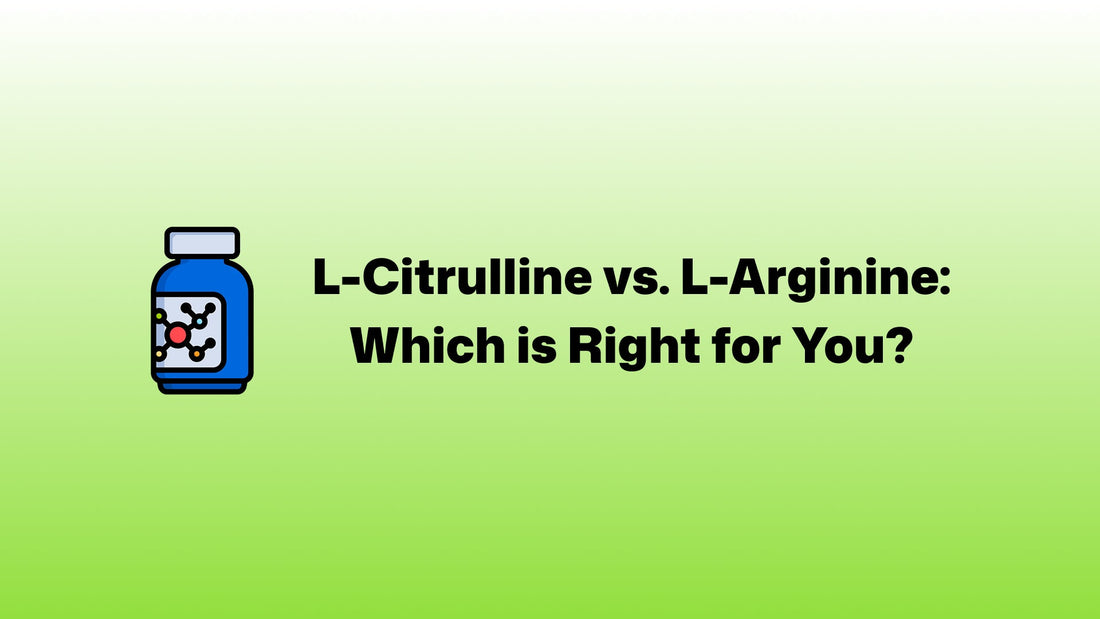
L-Citrulline vs L-Arginine: What Works Best and Why?
Share
L-Arginine and L-Citrulline are amino acids often used in nutritional supplements. They are known for their role in supporting circulation, physical performance, and energy metabolism. Both are involved in the same biological pathway but function in slightly different ways.
L-Arginine is directly used by the body to produce nitric oxide, a molecule that helps relax blood vessels and improve blood flow. L-Citrulline, on the other hand, is converted into L-Arginine in the body and then follows the same nitric oxide pathway.
These amino acids are also found in natural sources. L-Arginine is present in meats, dairy, and legumes. L-Citrulline is most commonly found in watermelon. However, the doses obtained from food are too low to deliver the effects often targeted through supplementation.
They are both commonly used in pre-workout products, cardiovascular support supplements, and wellness regimens aimed at improving blood circulation, reducing muscle fatigue, or boosting overall energy.
How Do They Work in the Body?
Both L-Arginine and L-Citrulline support nitric oxide production, but they enter the system through different routes. L-Arginine is absorbed in the small intestine and enters the bloodstream directly. However, a large portion of it is broken down by the liver before it can be used.
L-Citrulline avoids this breakdown. It travels to the kidneys, where it is converted into L-Arginine. This indirect route allows more L-Arginine to remain in circulation for longer, which results in more stable nitric oxide levels.
Nitric oxide acts as a vasodilator. It widens blood vessels and improves the delivery of oxygen and nutrients to muscles and organs. This process supports endurance, lowers blood pressure, and enhances recovery after physical exertion.
How long does it take for L-Arginine to work? Most users feel its effects within 30–90 minutes. L-Citrulline, although slower to start, may maintain its effect for several hours longer due to its sustained release pattern.
Main Differences Between L-Arginine and L-Citrulline
The key difference is how efficiently each one raises nitric oxide levels. L-Arginine acts quickly but is broken down rapidly. L-Citrulline takes longer to activate but results in more stable and prolonged nitric oxide availability.
L-Arginine is typically used for fast-acting support. However, many people experience variable results due to poor absorption. L-Citrulline, because of its better bioavailability, leads to more consistent outcomes.
L-Arginine is also more likely to cause digestive side effects when taken in high doses. Bloating, stomach pain, and nausea are commonly reported. L-Citrulline is better tolerated and has a lower risk of discomfort.
Is citrulline malate better than L-Arginine for pumps? Yes. Citrulline malate, a common supplement form of L-Citrulline, consistently delivers better muscle pumps, especially during strength training. It also supports energy production due to its malate content, which helps with aerobic metabolism.
Which One Is Better for Exercise and Performance?
L-Citrulline is generally more effective for exercise performance. This is because it delivers a steadier increase in nitric oxide, leading to improved endurance, better blood flow, and reduced post-workout fatigue.
Citrulline malate is often preferred by athletes and bodybuilders. In multiple studies, daily supplementation with 6–8 grams of citrulline malate has been linked to increased training volume, reduced muscle soreness, and improved time-to-fatigue during exercise.
L-Arginine may still be helpful when taken 30–45 minutes before short-duration workouts. It produces a quick nitric oxide boost, but its effects diminish faster, and the results can be inconsistent due to first-pass liver metabolism.
Does citrulline increase testosterone? There is no direct evidence that L-Citrulline or L-Arginine increases testosterone levels. Their impact is mainly through improving blood flow and physical endurance, not hormonal balance.
Are There Any Side Effects or Risks?
Both ingredients are considered safe for most healthy adults when used at appropriate doses. However, there are differences in how the body tolerates them.
L-Arginine, especially in doses above 6 grams, may cause digestive problems. Some users report gas, bloating, or diarrhea. It may also interact with medications that lower blood pressure or treat heart conditions.
L-Citrulline is better tolerated and has a lower risk of gastrointestinal discomfort. Even at higher doses (up to 10 grams), most users experience no side effects.
People with herpes virus infections should be cautious with L-Arginine, as it may trigger outbreaks in sensitive individuals. L-Citrulline does not carry this risk.
Anyone with chronic health conditions or taking blood pressure or erectile dysfunction medications should speak to a healthcare provider before using either supplement.
How Are They Used in Supplements?
L-Arginine and L-Citrulline are both available in standalone products and multi-ingredient blends. They are common in pre-workout formulas, nitric oxide boosters, and cardiovascular support supplements.
L-Arginine is often sold in powder or capsule form. Typical doses range from 3 to 6 grams per day. It is sometimes combined with B vitamins, magnesium, or antioxidants to support blood vessel function.
L-Citrulline is usually found as citrulline malate. This form is created by bonding L-Citrulline with malic acid, which enhances energy production. The standard dose is 6–8 grams before exercise or 3–5 grams daily for general support.
Some products combine both amino acids, attempting to deliver both immediate and long-lasting effects. Others use time-release capsules or stack the ingredients with beta-alanine or creatine for broader performance benefits.
Supplement form matters. L-Citrulline malate is more bioavailable than pure L-Citrulline. L-Arginine hydrochloride is the most common form of L-Arginine, but it is more acidic and can irritate the stomach in some individuals.
Can You Take L-Arginine and L-Citrulline Together?
Yes, they can be taken together and are often combined in performance supplements. This approach may help users benefit from both the fast action of L-Arginine and the longer-lasting effects of L-Citrulline.
The combination works best when timed strategically. L-Arginine can support immediate blood flow, while L-Citrulline maintains nitric oxide levels throughout the workout or recovery period.
However, combining both can increase the total amino acid load. Exceeding 10 grams in total may lead to stomach discomfort or diminish the benefits. For this reason, users should start with moderate doses and evaluate tolerance over time.
Some research suggests that combining them may offer only slight advantages compared to using L-Citrulline alone, especially if digestive comfort and absorption are priorities.
Which One Is More Suitable for Long-Term Use?
L-Citrulline is more suitable for long-term use due to its better absorption, lower side effect profile, and consistent nitric oxide support.
For individuals focusing on cardiovascular health, workout recovery, or sustained endurance, L-Citrulline provides a more reliable experience. It avoids the digestive issues associated with high-dose L-Arginine and produces a more stable response.
L-Arginine can be used long-term if well tolerated, but users often switch to L-Citrulline due to its smoother effects and longer duration. For chronic goals like blood pressure regulation or improved circulation, L-Citrulline offers greater predictability.
Daily use of either should be supported with hydration, adequate sleep, and a balanced diet, as these factors influence the effectiveness of amino acid metabolism.
Which One Should You Choose?
L-Citrulline is generally the better choice for most users due to its higher bioavailability, longer-lasting effects, and better digestive tolerance.
Choose L-Citrulline if:
- You want consistent endurance support or improved workout performance.
- You are sensitive to digestive side effects.
- You are focused on long-term use for heart health or recovery.
Choose L-Arginine if:
- You need a fast nitric oxide boost before short activities.
- You tolerate it well and are looking for immediate results.
-
You are using it under medical advice for specific cardiovascular goals.
Most people respond better to L-Citrulline over time. It builds a more stable nitric oxide profile and minimizes fluctuations in energy or blood flow. If unsure, starting with L-Citrulline is often safer and more effective.
Both amino acids have value, but L-Citrulline offers broader, longer-lasting benefits with fewer side effects. For individuals aiming to support performance, circulation, or overall vitality, it is often the more reliable option. L-Arginine remains useful in targeted cases, especially when fast action is needed. The choice depends on your personal goals, health profile, and response to each supplement.
